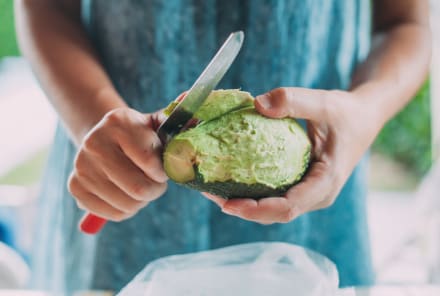Advertisement
Are Sugar-Sweetened Beverages All That Bad? Here's What New Research Says


If you're the type of person who has three beverages on their desk at all times, listen up: A new meta-analysis compared how six different types of popular drinks impact cardiovascular health and mortality risk. The findings could influence your go-to bev lineup, so let's dive in.
How popular drinks impact cardiovascular health
A new meta-analysis published in the journal American Society for Nutrition analyzed 20 different clinical studies to find the cardiovascular risks associated with six different beverages:
- Tea
- Coffee
- Fruit juice
- Energy drinks
- Alcohol
- Sugar-sweetened or artificially sweetened beverage
They found that long-term consumption of sugar-sweetened beverages (SSB) and alcohol increased the risk of cardiovascular mortality for both males and females.
Researchers were unable to determine the cardiovascular risk of fruit juices (which tend to be high in natural sugar) and energy drinks due to a lack of substantial data.
Still, previous research suggests energy drinks may be associated with cardiac arrhythmias, cardiac arrest, and myocardial ischemia1 (low blood flow, which can lead to blocked arteries). So it's fairly certain to say that energy drinks should probably be on the list of less-frequent consumption, even if there wasn't quite enough data to meta-analyze their impact on heart health in this review.
Why is sugar bad for the heart?
Interestingly, another research study published in the American Journal of Clinical Nutrition around the same time investigated whether physical activity could combat the effects of sugar-sweetened or artificially sweetened beverages2 on cardiovascular disease.
In this study, comprised of 100,000 adults, those who drank SSBs more than twice a week had a higher risk of cardiovascular disease, regardless of recommended levels of physical activity.
Now, don't get it twisted—exercise is great for the heart. However, this study suggests it may not fully diminish the negative effects of excessive sugary drinks, serving as another reason to be mindful of sugar intake.
Neither of these studies included the impact of the occasional sugar-sweetened beverage, so don't go overboard with restriction. Instead, just be mindful of how much sugar is in the drinks you're reaching for daily.
What to reach for instead
So, if you are that person who keeps a roundtable of beverages at all times, consider picking something lower in sugar when possible and saving those SSBs for special occasions. Below, a list of some A+ options to help inspire your next beverage break:
- Coffee (which was found to be heart-healthy in this new study)
- Herbal tea (which was found to be heart-healthy in this new study)
- Low-sugar kombucha
- Smoothies that contain fiber, protein, and healthy fats
- Healthy hot cocoa (our favorite recipe here)
- Coconut water
Reminder: When in doubt, check the label
The takeaway
A new meta-analysis review study found that long-term sugar-sweetened beverage (SSB) consumption increased the risk of cardiovascular mortality for both males and females. While this is important to note for daily habits, it's not an end-all-be-all discussion for the occasional sugar-sweetened beverage. After all, life is all about balance. If you feel a sugar craving coming on but want to skip the sweet drinks, these foods may help.
Watch Next
Enjoy some of our favorite clips from classes
Enjoy some of our favorite clips from classes
What Is Meditation?
Mindfulness/Spirituality | Light Watkins
Box Breathing
Mindfulness/Spirituality | Gwen Dittmar
What Breathwork Can Address
Mindfulness/Spirituality | Gwen Dittmar
The 8 Limbs of Yoga - What is Asana?
Yoga | Caley Alyssa
Two Standing Postures to Open Up Tight Hips
Yoga | Caley Alyssa
How Plants Can Optimize Athletic Performance
Nutrition | Rich Roll
What to Eat Before a Workout
Nutrition | Rich Roll
How Ayurveda Helps Us Navigate Modern Life
Nutrition | Sahara Rose
Messages About Love & Relationships
Love & Relationships | Esther Perel
Love Languages
Love & Relationships | Esther Perel
What Is Meditation?
Box Breathing
What Breathwork Can Address
The 8 Limbs of Yoga - What is Asana?
Two Standing Postures to Open Up Tight Hips
How Plants Can Optimize Athletic Performance
What to Eat Before a Workout
How Ayurveda Helps Us Navigate Modern Life
Messages About Love & Relationships
Love Languages
Advertisement

This Underconsumed Nutrient Helps Fight Gum Inflammation, Study Shows
Molly Knudsen, M.S., RDN

Research Shows Cognitive Longevity Depends On These 3 Critical Vitamins
Molly Knudsen, M.S., RDN

This Underconsumed Nutrient Helps Fight Gum Inflammation, Study Shows
Molly Knudsen, M.S., RDN

This Underconsumed Nutrient Helps Fight Gum Inflammation, Study Shows
Molly Knudsen, M.S., RDN

Research Shows Cognitive Longevity Depends On These 3 Critical Vitamins
Molly Knudsen, M.S., RDN

This Underconsumed Nutrient Helps Fight Gum Inflammation, Study Shows
Molly Knudsen, M.S., RDN











